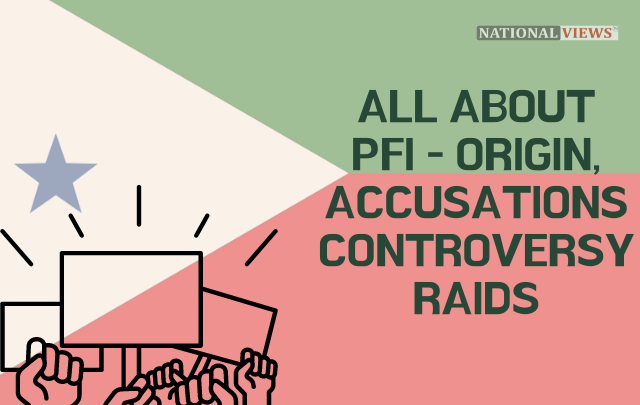Of late a lot has been said and talked about PFI – The Popular Front of India, an Islamist outfit that over some days has been raided by investigative agencies across India.
Let’s check out everything about this organization – from its origin to the recent raids across India
The Start – How Was Popular Front of India Formed?
The PFI was formed on November 22, 2006, by the merger of three Muslim organizations in southern India: the National Democratic Front of Kerala, the Karnataka Forum for Dignity, and the Manitha Neethi Pasarai of Tamil Nadu. Previously based in Kozhikode, the organization later relocated to Delhi. OMA Abdul Salam is the current chairman.
What does PFI Do? What are the Functions?
It describes itself on its website as an Indian social movement working for the total empowerment of the country’s marginalized sections. However, law enforcement agencies have frequently accused it of promoting radical Islam.
Although the PFI was founded with the intention of working for the socioeconomic advancement of Muslims in the country, the organization quickly came under the scrutiny of various state and federal agencies for all the wrong reasons, particularly following the 2010 incident of chopping off the hand of a college professor in Kerala for allegedly hurting religious sentiments through a question paper he had set.
On 22 September 2022, the NIA – National Investigation Agency conducted a raid on PFI across the country. The reason? Charges of money laundering and terror funding. The result? Detaining at least 100 of its activists and leaders.
The Accusations
The PFI has had the most visible presence in Kerala, where it has been accused of murder, communal rioting, intimidation, the radicalization of Muslim youth, and links to terrorist organizations on numerous occasions.
In 2012, the Kerala government, led by Congressman Oommen Chandy, informed the High Court that PFI was “nothing more than a reincarnation of the banned outfit Students Islamic Movement of India (SIMI) in another form.” SIMI was founded in Aligarh, Uttar Pradesh, in 1977 and was banned in 2001.
According to another affidavit submitted by the state government to the Kerala High Court in 2014, PFI activists were responsible for 27 political murders, 86 attempted murder cases, and over 125 cases of incitement of communal hatred.
Various agencies also investigated the group in connection with alleged “Love Jihad” incidents in Kerala, forced conversion of people of other faiths, and the disappearance of some people from the state to join the Islamic State in Afghanistan and Syria.
PFI and affiliated organisation activists have also been arrested in connection with the recent killings of RSS-BJP leaders in Kerala.
Also Read: Al-Baghdadi’s Death: the rise and fall of the leader of Islamic State
PFI’s Growth – The Many Branches of Popular Front of India
The Social Democratic Party of India (SDPI) emerged from the PFI in 2009 with the goal of addressing Muslim political issues. However, the SDPI is frequently accused of committing crimes against Hindus and causing communal riots across the country.
The PFI has a women’s wing in Kerala called the National Women’s Front, a student wing called Campus Front of India (CFI), an NGO called Rehab India Foundation, and a think tank called Empower India Foundation.
In July of this year, the Bihar police made shocking revelations about an 8-page PFI document discussing teaching a lesson to India’s majority community. The 8-page PFI document emphasizes the PFI goal for the coming years.
According to an excerpt from the document obtained by TOI,
“If 10% of the total Muslim population rallies behind it, the organisation will subjugate the majority community and restore the glory of Islam in India.” To achieve this goal, this roadmap has been prepared to be kept in mind by all PFI leaders and to guide the PFI cadres and the Muslim community in general towards this goal”
Demand for PFI’s ban
The call for a ban on PFI has grown over time.PFI has been named by several investigation agencies, including the National Investigation Agency (NIA), in numerous cases. The first Islamic State module busted by the NIA in Kerala included PFI members.
PFI and SDPI have been scrutinized in Uttar Pradesh following the anti-CAA violence that erupted in the state in 2019-20. In addition, several leaders of the Popular Front of India were named as suspects in the August 2020 Bengaluru riots.
Raids on PFI: Round 1
The ED is looking into –
- PFI’s alleged “financial links” in fueling anti-Citizenship (Amendment) Act protests across the country,
- 2020 Delhi riots,
- An alleged conspiracy in Hathras (a district in Uttar Pradesh) over the alleged gang-rape and
- Death of a Dalit woman, and a few other incidents.
The ED has filed its first charge sheet against PFI and CFI on money laundering charges in February last year, alleging that its members wanted to “incite communal riots and spread terror” in the aftermath of the Hathras gang rape case in 2020.
The charge sheet has the following names
- K A Rauf Sherif, CFI’s national general secretary and a PFI member
- Atikur Rahman, CFI’s national treasurer;
- Masud Ahmed, CFI’s Delhi-based general secretary;
- Siddique Kappan, a journalist “associated with PFI,” and
- Mohammed Alam, another CFI/PFI member.
Raids on PFI: Round 2
The second round of nationwide crackdown on the organization is underway. 247 (as on September 27) have been arrested so far across the country in Maharashtra (25), Madhya Pradesh (21), Karnataka (80+ ), Assam (25), Delhi (30), Kerala (2)Gujarat (17), Telangana and Uttar Pradesh (57).


